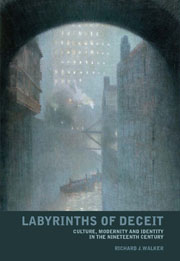Book contents
- Frontmatter
- Contents
- Acknowledgements
- Introduction: Tracing the fragments of modernity
- Part I (De)Generating doubles: duality and the split personality in the prose writing of James Hogg, Robert Louis Stevenson and Oscar Wilde
- Introduction
- 1 Speaking and answering in the character of another: James Hogg's private memoirs
- 2 He, I say – I cannot say, I: Robert Louis Stevenson's strange case
- 3 The psychopathology of everyday narcissism: Oscar Wilde's picture
- Part II The stripping of the halo: religion and identity in the poetry of Alfred Tennyson, James ‘B. V.’ Thomson and Gerard Manley Hopkins
- Part III Infected ecstasy: addiction and modernity in the work of Thomas De Quincey, Alfred Tennyson, Christina Rossetti and Bram Stoker
- Conclusion: Ghost-script
- Notes
- Bibliography
- Index
Introduction
from Part I - (De)Generating doubles: duality and the split personality in the prose writing of James Hogg, Robert Louis Stevenson and Oscar Wilde
- Frontmatter
- Contents
- Acknowledgements
- Introduction: Tracing the fragments of modernity
- Part I (De)Generating doubles: duality and the split personality in the prose writing of James Hogg, Robert Louis Stevenson and Oscar Wilde
- Introduction
- 1 Speaking and answering in the character of another: James Hogg's private memoirs
- 2 He, I say – I cannot say, I: Robert Louis Stevenson's strange case
- 3 The psychopathology of everyday narcissism: Oscar Wilde's picture
- Part II The stripping of the halo: religion and identity in the poetry of Alfred Tennyson, James ‘B. V.’ Thomson and Gerard Manley Hopkins
- Part III Infected ecstasy: addiction and modernity in the work of Thomas De Quincey, Alfred Tennyson, Christina Rossetti and Bram Stoker
- Conclusion: Ghost-script
- Notes
- Bibliography
- Index
Summary
[D]elusions are familiar to every medical man conversant with insanity. Two contradictory and incompatible convictions. Here is no defective government of moral or sensual propensities, but two distinct acts of the thinking powers destructive of each other. It seems to me absolutely impossible to conceive any other explanation than the possession of two distinctive minds – results of two distinct organs of thought.
Those who go beneath the surface do so at their peril.
In his treatise of 1844, The Duality of the Mind, the physician A. L. Wigan determined to demonstrate that the human brain consisted of two distinct cerebra, each of which was manifestly capable of being in conflict with the other within the individual. Wigan subtitled his work ‘A new view of insanity … proved by the structure, functions, and diseases of the brain, and by the phenomena of mental derangement, and shown to be essential to moral responsibility’, and aimed to prove that ‘each cerebrum is capable of a distinct and separate volition, and that these are very often opposing volitions’. What Wigan argues for is a fundamental duality within human consciousness, where the human brain is divided and capable, when ‘opposing volitions’ exist, of entering a state of conflict. To have a divided brain therefore is to have the potential to be at war with oneself, or, as Wigan puts it, when ‘[t]wo contradictory and incompatible convictions’ occur, ‘two distinct acts of the thinking powers destructive of each other’ emerge.
- Type
- Chapter
- Information
- Labyrinths of DeceitCulture, Modernity and Identity in the Nineteenth Century, pp. 29 - 48Publisher: Liverpool University PressPrint publication year: 2008



